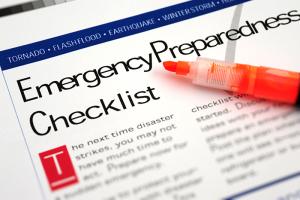Checklist
HHS issues Ebola preparedness checklist for hospitals
www.cdc.gov/vhf/ebola/pdf/hospital-checklisk-ebola-preparedness.pdf
The Health & Human Services (HHS) Office of the Assistant Secretary for Preparedness and Response and the Centers for Disease Control and Prevention released a detailed checklist to help hospitals manage patients with Ebola virus disease (EVD). The first of a suite of HHS checklists in development, it highlights key areas for hospital staff to review in preparation for a person with EVD arriving for medical care, and provides suggestions to help detect possible cases, protect employees and respond appropriately.
DEA rule allows hospitals to collect controlled substances
www.deadiversion.usdoj.gov/fed_regs/rules/2014/2014-20926.pdf
The Drug Enforcement Administration (DEA) published a final rule allowing hospitals with on-site pharmacies to volunteer to administer mail-back programs and maintain collection receptacles for patients to safely dispose of unused, unwanted or expired pharmaceutical controlled substances. Law enforcement agencies, narcotic treatment programs and retail pharmacies are also among the organizations authorized to voluntarily administer such programs. Effective Oct. 9, the rule requires that hospitals wishing to run mail-back programs must provide mail-back packages to potential users at no cost or limited cost.
Joint Commission provides violence prevention advice
The Joint Commission recently published advice on preventing violent and criminal events in health care facilities, including tips on identifying risks and planning to reduce the risks, environmental design, administrative controls, training, maintaining a safety culture and planning for post-event activities. It also includes a list of available resources from the Centers for Disease Control and Prevention, the National Association of Psychiatric Health Systems, the National Research and Training Center and others.
Report: DHS ill-prepared for pandemic response
www.oig.dhs.gov/assets/pr/2014/oigpr_090814.pdf
The Department of Homeland Security (DHS) cannot ensure that it has sufficient personal-protective equipment (PPE) and antiviral medical countermeasures to respond to a pandemic, or that the supplies on hand remain effective, the agency's Office of Inspector General (OIG) reported. For example, OIG found that DHS and its components do not know where its PPE is located, how much it has and the usability of the stockpiles that exist. In addition, 84 percent of the hand sanitizer in PPE stockpiles has expired and 81 percent of the department's antiviral drugs will expire by the end of 2015.
Joint Commission warns about tubing misconnection risks
The Joint Commission recently issued a Sentinel Event Alert containing updated recommendations and strategies to prevent tubing misconnections as the health care field transitions to new manufacturing standards for medical tubing connectors. Developed by the International Organization for Standardization, the new standards are expected to make tubing misconnections nearly impossible, but old connectors will remain in the market until they are sold out, leading to potential confusion, according to the alert. It urges hospitals, long-term care facilities, home health providers and others that use medical tubing to begin planning for the October transition to the new connectors and remain alert for possible misconnections.




